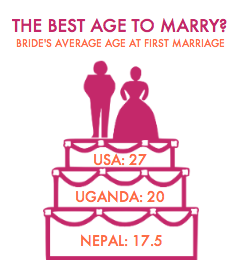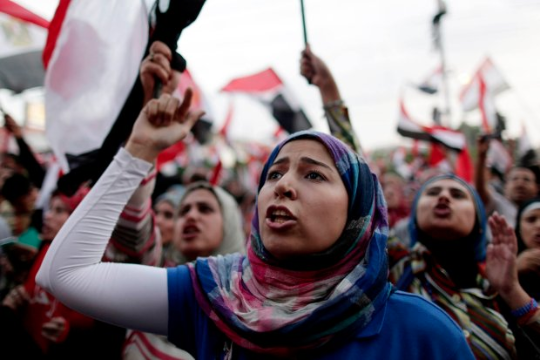
July 18, 2013 | Politics and Leadership, War and Peace
Egypt’s Women: We’re Baaaack
And we won't get fooled again

When Egyptian women massed in Tahrir Square in 2011, they were hopeful. The overthrow of President Mubarak's repressive regime seemed to open up a space for them to make themselves heard. But when it came time to draft a new post-Mubarak government, women were pushed to the side and virtually silenced. With the Muslim Brotherhood in charge, women seemed to be losing even the rights they'd enjoyed under the previous administration.
Fast-forward two and a half years, and the deja vu is dizzying. Another wave of protests, another president deposed—but this time, Egyptian women aren't yielding their power, according to Hoda Elsadda, a longtime activist who serves on the board of the Global Fund for Women.
"We've become much more bold with our demands, much more confrontational," says Elsadda, a gender studies academician. "We are also less afraid of consequences."
HOW TO HELP WOMEN IN EGYPT
- Harassmap - This Egyptian nonprofit posts maps of sexual assaults and rallies citizens against these crimes.
- Plan Egypt – The group supports children and women with education and initiatives for basic needs and rights
Women like Elsadda are seeking political participation and personal freedom in the new Egypt. They want an end to the discourse that permeated President Morsi's brief—"blaming women for every ill of society, women are supposed to stay at home, sort of disappear from public space," as Elsadda puts it.
Someone seems to be listening. The freshly sworn-in interim government now has three female ministers, more than any administration in Egypt's history. The hope is that these new appointees—as the heads of the bureaus of health, environment and information—will lead the charge for even more gender equality.
Women are also demanding an end to the ongoing sexual attacks that have made Tahrir Square infamous. Groups such as Operation Anti-Sexual Harassment and Tahir Bodyguard have arisen to protect women.
Although the latest upheaval in Egypt has brought a new surge of rape and antiwoman crime, Elsadda isn't discouraged. "I think what's happening now is that we're facing a lot of problems that have been basically repressed and these are just surfacing very quickly," she says.
"The last two years and a half have made us all aware how difficult it is to bring about a real revolution," she adds. "Not just changing one government with another government, but really changing a system of inequality and social injustice."
Those changes have been particularly hard for the female half of society, she says. "Women pay a very high price, so if there's violence, they suffer more violence; if there are processes of exclusion, they are the first to be excluded, and so on and so on. We always say women are the poorest of the poor."
But this time, she vows, things will be different. "We're still trying to fight this idea that women and Muslim women in Egypt are victims and they are helpless," she says. "Long-term, I'm optimistic because at I think that at least we've taken a first step."